- Home
- Sarah Zettel
Laurel
Laurel Read online
PRAISE FOR THE QUEENS OF CAMELOT
Risa: In Camelot’s Shadow
“Based on the famous poem ‘Sir Gawain and the Green Knight,’ this novel delivers passion, danger and excitement laced with fantasy.” —Romantic Times Bookclub
“Sarah Zettel incorporates elements of Arthurian legend into her story with flair, skill and lyrical writing. … In Camelot’s Shadow is an engrossing and spellbinding tale and I can hardly wait for the sequel!” —Bookloons
“Zettel has brilliantly made a familiar story fresh and vibrant. The story just sings.” —Romantic Science Fiction & Fantasy
Elen: For Camelot’s Honor
“An exciting and seductive journey laced with plenty of magic and romance.” —Romantic Times Book Reviews
“An intriguing story that fans of Arthurian legend will not want to miss.” —CataRomance Reviews
Lynet: Under Camelot’s Banner
“High fantasy at its best.” —SFF Chronicles
“[Under Camelot’s Banner] is a blend of legend, myth and fantasy. … The author demonstrates a passion for the classic Arthurian story.” —Historical Novel Society
Laurel: By Camelot’s Blood
“A real happy ending takes love, effort, and sacrifice. Pick up a copy of Camelot’s Blood if you want an epic romance!” —Silver Petticoat Reviews
Laurel: By Camelot’s Blood
The Queens of Camelot
Sarah Zettel
This book is dedicated to the memory of Catherine L. Moore
PROLOGUE
My narrow chamber seems a little darker today. Through my slit of a window I see the sky is clear and blue but daylight does not penetrate here. These stones in these walls are effective guardians, and in my fancy they lean a little too close, as if they want to see what I write upon this page.
I do not wish them to see. I do not wish any to see. This may be the final proof that my wits – in which I have taken such pride – have deserted me. Yet I do not pause in my writing.
It is also possible that this thing is true.
This is not the first time I have written of my wandering monk. A bluff, hearty man with a warrior’s arms, and a pilgrim’s staff. He visits me frequently, providing laughter for my old age, and an ear for my thoughts. Indeed, it is because of him that I have ventured to set these chronicles of lost Camelot down.
He came again today. I was sitting in one of my usual retreats, beside the hazel tree that stands hard by the monastery’s stone wall. There is an old stone bench there where I like to rest, for the peace and the chance to let the sun bake some of the pain from my old, twisted bones.
The monk climbed through the breach in the wall, was tall and hale and smiling as ever, and his shadow was long in the evening sun as he strode across the grounds.
And I swear before God, this is a true record of the conversation we held:
‘God be with you this evening, Sir Kai!’ He is the last to call me by this title.
‘And God be with you, Brother.’ I paused and let us be silent for a moment. His silences are always comfortable things. Since I mean to record only the truth here, I will say that for one of the few times in my life I was afraid to speak. But at last my fear galled me too strongly, and I did speak again.
‘A strange thought occurred to me lately, Brother.’
‘And what is that, Sir Kai?’
‘That for all the deep discourse you and I have held, and despite our many friendly meetings, you have never once told me your name.’
‘Nor have I.’ He smiled, a wry smile. He looked like a talespinner who knows his audience has anticipated his carefully crafted joke. ‘But then, you have never asked me.’
Which was true, and until recently I had not stopped to wonder at it.
‘I spoke to the Abbot about you. Do you know what he told me?’
‘Should I?’
‘He told me there was no such a one as you who came visiting here. He told me I should pray hard, for the Lord had clearly granted me visions, or perhaps the Devil had. He seemed unclear as to which it might be. He did say I’m often seen talking to myself, but no broad, bearded monk with a white staff had ever been seen, with me or without me.’
The monk nodded, judiciously, as if trying to decide the merits of my declaration. ‘What do you think I am?’ he asked.
‘That, Brother, is an intriguing question.’ I am amazed at how calmly I spoke. But then, I have seen many a strange thing in my long days. Usually, though, they came in far less mundane forms than this monk. ‘I note you do not deny that you are a vision.’
He shrugged. ‘We are all many things as we pass our time under Heaven.’
‘This is so.’ I loaded my final bolt. ‘They tell a tale in these lands. It is of a man who came from the west of my own island, brought here as a slave from the Dumonii lands. He became a holy man, they say. They say he converted the heathen and the pagan here, and performed many miracles.’ I narrowed my eyes at my companion. ‘Might your name be Patrick?’
My monk laughed, loud and openly. ‘It might, Sir Kai. It might.’
I should have been afraid. I had been afraid to begin this. Now that it was begun, though, it seemed right and natural that our conversation take this turn. How could I be afraid of this … this vision who had become both comforter and familiar gadfly? I admit that more than anything, I was rankled. No man likes his fellows – even taciturn monks of little imagination and less wit – to think he has lost his reason. I felt this companionable vision might have done me the courtesy of showing itself to the brethren so I would not be mistaken for a dotard.
‘You are supposed to be dead.’
Patrick slapped his knee and got to his feet. ‘Time will come, Sir Kai, when you are supposed to be a dream.’
Fear at last came on me. Not from his words, but from the thought that my words might drive him away, never to return. Age and loneliness pressed heavy on my head. ‘Will you come back?’ I heard the quaver in my voice, and was ashamed.
Patrick nodded, his face comprehending, but blessedly free of pity. I do not know if I could have borne that. He laid that warm, work-worn hand on my shoulder. ‘Fear not, Kai. I will come back at the proper time.’
He walked away, stepping through the gap in the wall, leaving not even his shadow behind.
So, I sit here in this dark, stone cell, wondering what I have seen and why, and what this proper time might be. The pain in my legs is bad today. I feel the time of endings closing in on me like these too-close walls of my cell. I fear it, as men are wont do, and yet I welcome it too. I fear not seeing the days to come, and yet I fear seeing them, for I have already seen so much in my lifetime and I am so very tired of it.
So, to keep these great and terrible feelings at bay, I begin writing once more. I have not yet set down the tale of Agravain, the second of the sons of Lot. He is the one of my nephews to whom I was closest, which perhaps is why my hand shakes now that I think to write of him. But it was also he and his bride who brought about a great ending that was in itself a beginning, although none of us knew it at the time.
Here then begins the tale of Sir Agravain and the Lady Laurel Carnbrea.
Kai pen Hir ap Cynyr
At the Monastery of Gillean,
Eire
ONE
In the fortress of Din Eityn, the king lay dying.
Din Eityn squatted on a great black precipice, as old and as solid as if it had been carved from the living rock. Men who knew nothing but the working of stones and the worship of wells had once come here. They laid down stones without mortar to shelter themselves from the wind. Other men, ones who knew the working of bronze and understood the secrets of oak and mistletoe, came to cast these ancient ones out. They wove wicker fences and raised the walls hig
her. The the Romans drove all before them and took the great precipice after a bloody siege that was still sung of by bards and poets in both lands. They squared the walls of Din Eityn and built towers to better keep the watch.
That was four generations ago. The Romans were fled, but the rock and its many-layered fortress now called Din Eityn remained. The sons of the bronze-workers reclaimed the great place and they ruled on the thrones and the bones of their ancestors.
Now, Lot, the oldest surviving son of that lineage, screamed with the pain of his own passing.
The king’s screams caused surprisingly little disturbance in that dark keep. Some men, drowsing in the court under the summer stars, turned and muttered beneath their harsh woollen blankets. Others, lounging on the parapets while drinking from their leather bottles or playing at bones beside their fires, cursed the noise and kicked the hounds who tried to howl in response.
King Lot had been laid in his great bed in his great hall. A fire burned brightly beside his resting place, and the linens tangled around his arms and legs were the finest that could be provided. These things brought him no comfort. Pain tossed him from side to side, dragging his cries and his moans from his ravaged throat. But none dared approach him. Not one of the cowering women who hovered in the dark doorway brought cloth or herb to their king, even now that the swelling in his legs had so greatly increased that he could not rise. None of the men slouched at the far end of the hall so much as looked up.
Only the two chieftains who sat on the other side of the fire from the bed made any move.
Lord Pedair rubbed his eyes. He was a grey, old man now, stooped by the weight of the years. The long nights of watching had left him weary and heartsick. He had known Lot in cleaner times, when they were both stronger, better men. It was a painful thing to see what Din Eityn had become, almost as painful as to see what had happened to Lot. The king’s madness had driven away all men of strength and loyalty. Instead, he had surrounded himself with the corrupt and the cringing, who would follow any order, no matter how mad, as long as they could plunder the folk of Gododdin, and anyone else who crossed their paths.
‘Will he hold long enough for word to reach Camelot?’ Pedair asked.
‘I do not know. They are laying bets in the forecourt now.’ Ruadh’s mouth curled into a sneer of distaste. Time had robbed Lord Ruadh of all the hair on his head and turned his long moustaches pure white. It had not, however, clouded his eyes nor his judgment. Like Pedair beside him, Ruadh had ridden to war with Lot in aid of King Arthur. He was the only other one who offered to take the night watches with Pedair. The king could not die without witness.
Lot kicked at his coverings. His feet were so swollen the skin on them had cracked and the wounds oozed with clear matter. The stench of illness hung heavily in the great square chamber. The swelling should be lanced. There should be hot cloths and poultices.
And I do not move. Pedair’s hands dangled uselessly between his knees. That is my king and my friend there, and I do not move.
Lot writhed, his torso twisting and his arms flailing at nothing at all. His head fell towards Pedair, and Pedair saw the king’s face contorted by pain and rage, his cracked teeth bared, his eyes burning.
‘Traitor!’ Lot roared. ‘Stinking, whoreson traitor! Come to pick over my bones, Pedair? Come to dance on my tomb!’ His mouth stretched into a horrible leer. ‘Stay then, vulture! Maybe she’ll take a liking to you next and you’ll be dancing for the devil to her tune!’ He laughed, a sound more harsh and horrible than his screams. ‘Dance like me!’ He lifted one grotesquely swollen leg and the words died away in a scream of pain.
‘How much longer can he last?’ Pedair whispered when he could speak again.
Ruadh shook his bald head slowly. ‘Not long. God be praised.’
‘Kill them!’ bellowed Lot, his hands clenching into fists, strangling nothing but air. ‘God rot them! Crush them!’ In the next second, his hands fell to the furs and all the anger drained from his face. ‘Water,’ he rasped plaintively. ‘I thirst. I burn. Mercy’s sake, someone bring me water.’
Pedair looked sideways at Ruadh, spat into the fire, and slowly got to his feet. A pitcher and two wooden mugs stood between the men’s stools. Pedair filled one with small beer, splashing dark droplets onto the stones. Slowly, shuffling from the stiffness in his knees, he brought it to the king’s bedside. Lot looked at him, and for a moment, Pedair thought he saw his liege in the depths of those fever-bright eyes. He held the tankard to Lot’s lips.
Fury distorted Lot’s face again, and he lashed out, grabbing and twisting at Pedair’s arm. Pedair cried out in pain, and dropped the mug, splashing ale everywhere.
‘Poison!’ bawled Lot. ‘You’d poison your king, whoreson! I’ll hang your head from my gate!’ He shoved Pedair, sending him reeling back towards the fire. Ruadh caught him before he stumbled into the flames and helped him to his seat again.
‘He still sees.’ Rubbing his wrist and panting for breath, Pedair watched the king sink back onto his bed, plucking restlessly at the furs and muttering his curses.
‘But what does he see?’ asked Ruadh. ‘We should have sent to Camelot before this.
Pedair watched his king lashing from side to side, as if to avoid a series of blows. ‘Had there been any way to do so in secret, I would have.’
‘I know,’ said Ruadh. ‘I know.’
The king groaned, a low, harsh horrible sound and for a moment, he strained to sit up, his eyes gleaming in the firelight and his mouth gaping in an evil grin. But his strength did not hold, and Lot collapsed back onto his bed.
‘You come,’ the words came out between Lot’s gasps for breath. ‘Even now you come to me.’
The wretched king paused, listening to that voice only he could hear, and his face twisted with a deeper pain. ‘No. It is not true!’
Pedair knotted his fists. How much longer could he stand to wait? It was obscene to sit here while a strong man writhed in pain, while his hands clutched the linens and sweat ran down his brow.
‘It is not true! You are not she! You are not! Oh, God, no! Morgause! Morgause! Don’t leave me!’
Pedair started forward, but Ruadh laid a hand on his arm. ‘Do not let him come to grips with you again, Pedair. He’s killed a man in his fits. He’ll do the same to you.’
‘Morgause!’ the king shouted. ‘Morgause where are you! It is not true! It is not true!’ The last word choked Lot, and the scream faded into weeping, before rising again, a cry of rage and pain and the last strength of a man trying to hold back death and despair with nothing but his own broken will.
The old men bowed their heads and as best they could, they prayed for the dawn.
TWO
‘My lady? Their Majesties summon you.’
Laurel Carnbrea, until lately the Queen of Cambryn, turned away from the window that looked over Camelot’s yard. The sun was just setting and the rich light of the summer’s evening warmed and gilded the world. The two girls sent up from the great hall were dressed to match, in fine linen and golden girdles. Their relative youth made Laurel think they must be new to their positions. Their youth, and the way they openly looked Laurel up and down, weighing her appearance against their own. Laurel smiled a little at this. It was not these two whose judgment she needed to worry about.
‘Well, Meg?’ she said to her own woman. ‘Am I fit to be presented?’
Meg, an aging, bone-thin woman more soberly dressed in brown and cream, looked Laurel up and down herself. Her eyes narrowed to slits, the better to discern a wrinkle in sleeve or neckline, or an ill-considered fold of cloth in Laurel’s trailing skirt. For the past three hours, Meg had circled the room like a hawk. Laurel’s handmaids, Plump Cryda and little brown Elsa were both flushed and fluttery from Meg’s constant stream of orders intended to make sure Laurel’s layers of rich dress and ornament were displayed to perfection.
All of which had made Laurel feel like nothing so much as a horse being readied for sale.
>
It was, however, necessary. Cambryn, the land which Laurel personified at this moment, must make a good showing of its wealth before the great court. To that end, she wore an underdress of rich, black wool that turned her translucent skin nearly pure white. Over this was laid a gown of vibrant blue silk brought from Byzantium. The sea at midday never saw such a colour. Its sleeves brushed her fingertips like the lightest of whispers and trailed down to the floor. This had been one of her mother’s treasures, laid away against such a time. A heavy golden girdle with links shaped into sun disks and studded with blue Turkish glass belted her waist. This matched the necklace at her throat. Golden cuffs circled her wrists and a gold band held the delicate black veil embroidered with bright blue thread that covered Laurel’s startling white-gold hair, which itself had been braided with sapphire ribbons and golden beads.
Meg had tried to get Laurel to leave behind the ring of small keys that belonged to her dowry chests, on the grounds they made her look more like a merchant’s wife than a queen, but Laurel refused. She had carried keys at her waist since she was nine years old. These few were all that were left to her, but she would not lay them aside. The idea made her feel as if she were being asked to walk into the court stark naked.
At last, Meg nodded judiciously. ‘You’ll bring us no shame, my lady.’
‘Well then.’ Laurel drew herself up. ‘Let us go meet the man I am to marry.’
Trusting Meg to marshal Cryda and Elsa into a proper procession to carry the betrothal gifts. Laurel schooled her expression into one of calm dignity. She lifted her hems, and followed Queen Guinevere’s ladies out through the corridors of Camelot.
This was not the first time Laurel had walked these arched and painted corridors. She had lived with King Arthur’s court for three years as a waiting woman to the queen. She could have chosen to stay longer, but at the time she had thought her place and her duty lay in the land where her father served as steward. Queen Guinevere had respected that decision and let her return to her father’s house.

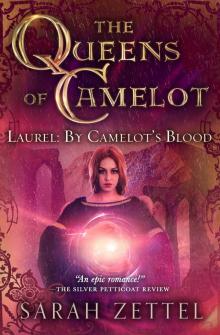 Laurel
Laurel A Mother's Lie
A Mother's Lie Playing God
Playing God Dust girl
Dust girl Sword of the Deceiver
Sword of the Deceiver Let Them Eat Stake: A Vampire Chef Novel
Let Them Eat Stake: A Vampire Chef Novel Dust Girl: The American Fairy Trilogy Book 1
Dust Girl: The American Fairy Trilogy Book 1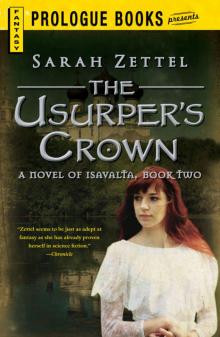 The Usurper's Crown
The Usurper's Crown For Camelot's Honor
For Camelot's Honor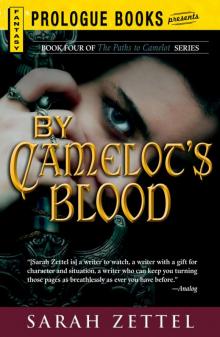 Camelot's Blood
Camelot's Blood Kingdom of Cages
Kingdom of Cages Fool's War
Fool's War Golden Girl
Golden Girl A Sorcerer’s Treason
A Sorcerer’s Treason The Firebird's Vengeance
The Firebird's Vengeance A Taste of the Nightlife
A Taste of the Nightlife Assassin's Masque (Palace of Spies Book 3)
Assassin's Masque (Palace of Spies Book 3) Reclamation
Reclamation Bad Luck Girl
Bad Luck Girl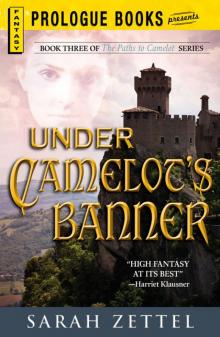 Under Camelot's Banner
Under Camelot's Banner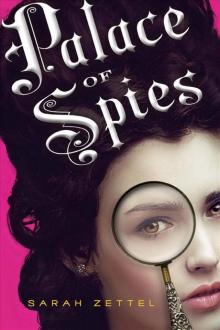 Palace of Spies
Palace of Spies Dangerous Deceptions
Dangerous Deceptions Quiet Invasion
Quiet Invasion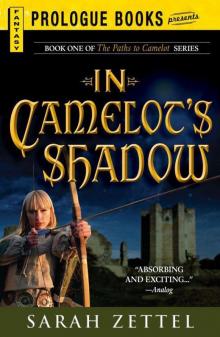 In Camelot’s Shadow: Book One of The Paths to Camelot Series (Prologue Fantasy)
In Camelot’s Shadow: Book One of The Paths to Camelot Series (Prologue Fantasy)